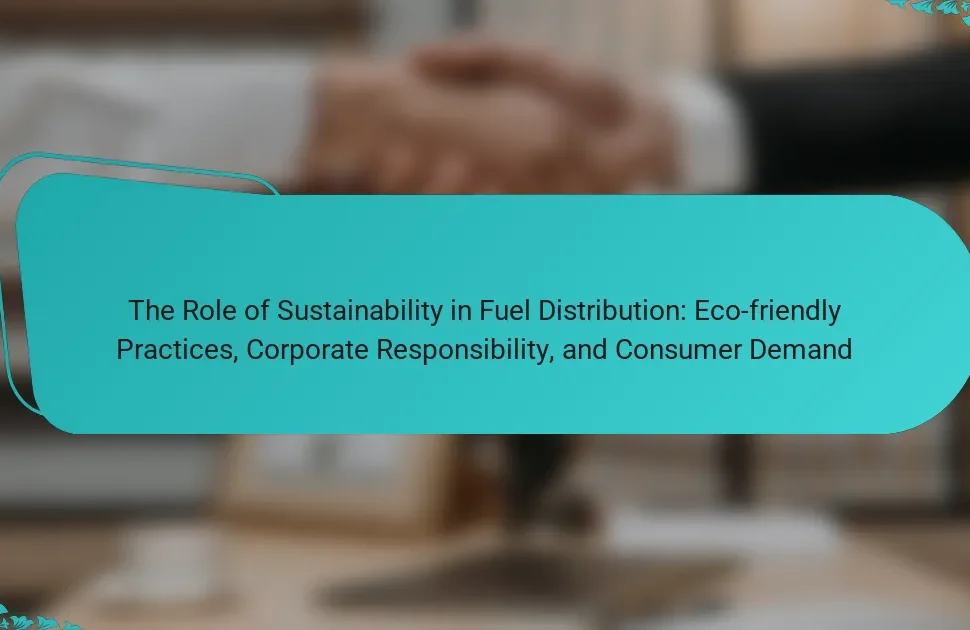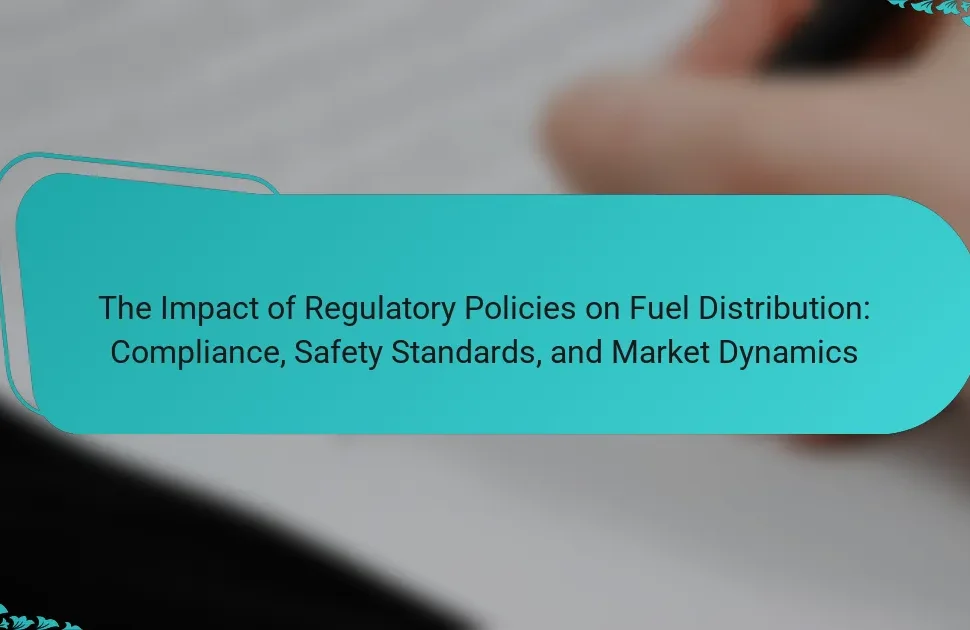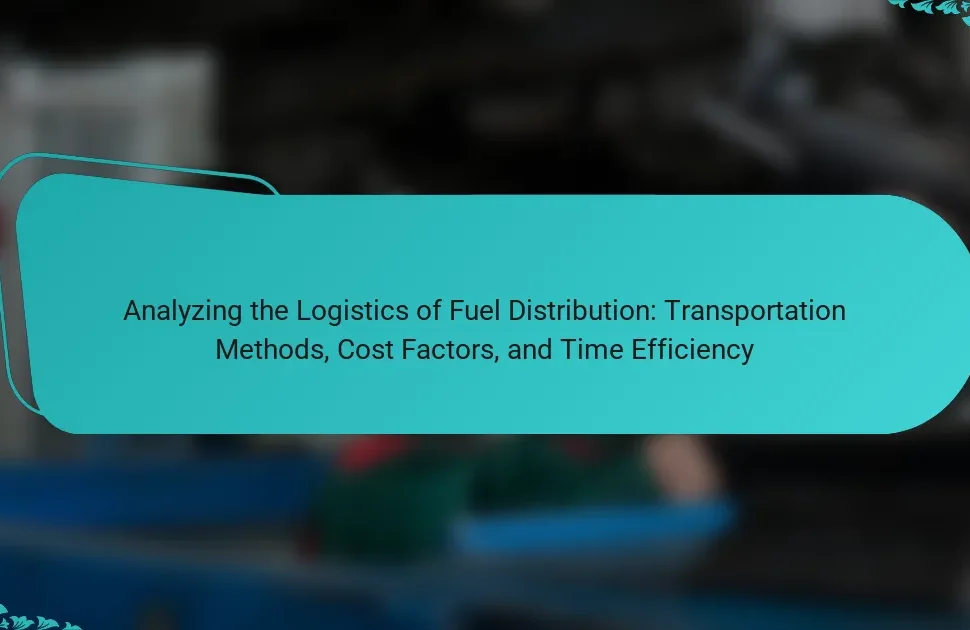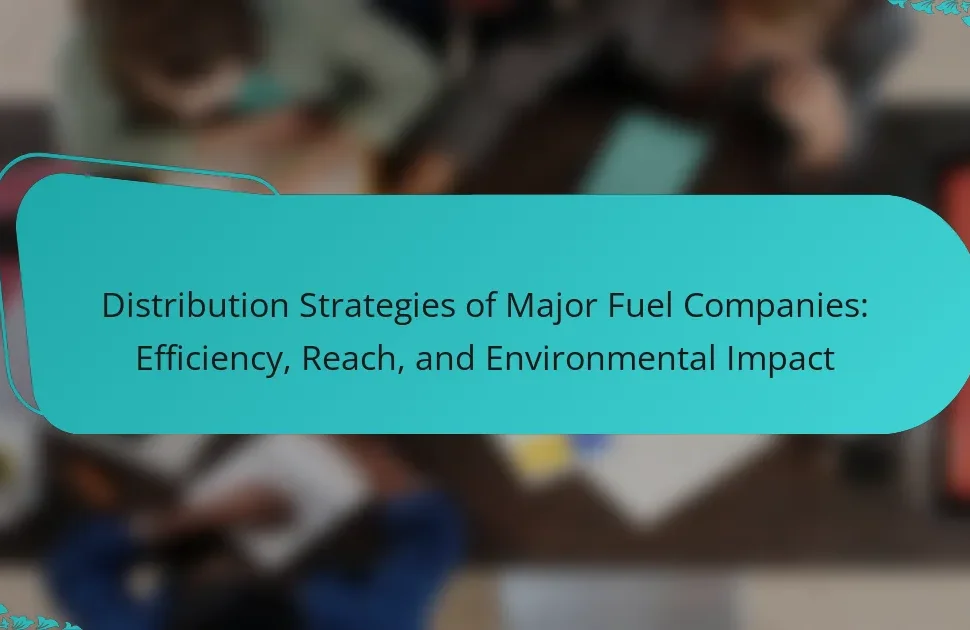
What is Fuel Supply Chain Management?
Fuel Supply Chain Management is the process of overseeing the entire lifecycle of fuel, from production to delivery. It involves various stages including sourcing, refining, transportation, and distribution. Effective management ensures that fuel is available when and where it is needed. It also aims to minimize costs and optimize efficiency throughout the supply chain. Key components include inventory management, logistics coordination, and demand forecasting. Studies show that efficient fuel supply chain management can lead to significant cost savings and improved service levels. For instance, a report by the International Energy Agency highlights the importance of streamlined operations in reducing supply chain disruptions.
How does Fuel Supply Chain Management operate?
Fuel Supply Chain Management operates by coordinating the flow of fuel from production to consumption. It involves multiple stages including sourcing, refining, transportation, storage, and distribution. Each stage requires careful planning and execution to ensure efficiency. Suppliers extract crude oil, which is then refined into usable fuel products. Transportation methods, such as pipelines and tankers, move fuel to storage facilities. From there, fuel is distributed to retailers or end-users. Effective management minimizes costs and maximizes reliability. Advanced technologies and data analytics are often employed to optimize operations and predict demand. Regulations and safety standards also play a critical role in ensuring compliance throughout the supply chain.
What are the key components of Fuel Supply Chain Management?
The key components of Fuel Supply Chain Management include sourcing, transportation, storage, distribution, and inventory management. Sourcing involves obtaining fuel from suppliers or refineries. Transportation refers to the movement of fuel via pipelines, trucks, or ships. Storage encompasses facilities where fuel is held before distribution. Distribution is the process of delivering fuel to end-users or retail outlets. Inventory management ensures that fuel levels are maintained efficiently to meet demand while minimizing costs. Each component plays a critical role in ensuring a smooth and efficient fuel supply chain.
How do these components interact within the supply chain?
Components within the fuel supply chain interact through a series of interconnected processes. These processes include sourcing, refining, distribution, and retailing. Each component relies on the others to function efficiently. For example, suppliers provide crude oil to refineries. Refineries convert crude oil into usable fuel products. Distribution networks then transport these products to various locations. Retailers sell the final products to consumers. Effective communication and coordination among these components are crucial. Disruptions in one area can impact the entire supply chain. Studies have shown that supply chain integration enhances efficiency and reduces costs.
Why is Fuel Supply Chain Management important?
Fuel Supply Chain Management is important because it ensures the efficient delivery of fuel from production to end-users. Effective management minimizes delays and reduces costs associated with fuel distribution. It also enhances supply reliability, which is crucial for industries relying on consistent fuel access. According to the U.S. Energy Information Administration, disruptions in the fuel supply chain can lead to significant economic impacts. Additionally, fuel supply chain management helps in maintaining safety standards and regulatory compliance. This is vital for preventing accidents and environmental hazards. By optimizing logistics, companies can improve their overall operational efficiency and sustainability.
What are the benefits of effective Fuel Supply Chain Management?
Effective Fuel Supply Chain Management enhances efficiency and reduces costs. It streamlines operations from sourcing to delivery. Improved forecasting minimizes stockouts and excess inventory. Enhanced visibility allows for better decision-making and responsiveness. It also fosters stronger supplier relationships, leading to better pricing and service. According to the American Petroleum Institute, optimized supply chains can reduce operational costs by up to 15%. Furthermore, effective management can improve compliance with regulatory requirements. This leads to fewer legal issues and fines. Overall, these benefits contribute to increased profitability and sustainability in the fuel sector.
How does Fuel Supply Chain Management impact the economy?
Fuel Supply Chain Management significantly impacts the economy by ensuring efficient distribution and availability of fuel resources. Efficient management reduces costs associated with transportation and storage. This, in turn, lowers fuel prices for consumers and businesses. Additionally, effective supply chain practices enhance energy security and reliability. A stable fuel supply supports various economic activities, including transportation, manufacturing, and agriculture. According to the U.S. Energy Information Administration, fluctuations in fuel supply can lead to economic instability. Thus, Fuel Supply Chain Management is crucial for maintaining economic growth and stability.

Who are the key players in Fuel Supply Chain Management?
The key players in Fuel Supply Chain Management include producers, refiners, distributors, retailers, and logistics providers. Producers extract crude oil and natural gas, forming the initial stage of the supply chain. Refiners process crude oil into usable fuel products like gasoline and diesel. Distributors transport these refined products to various markets. Retailers, such as gas stations, sell fuel directly to consumers. Logistics providers manage the transportation and storage of fuel throughout the supply chain. Each of these players is essential for ensuring a smooth operation and delivery of fuel products.
What roles do suppliers play in Fuel Supply Chain Management?
Suppliers play a critical role in Fuel Supply Chain Management. They provide the raw materials necessary for fuel production. This includes crude oil and natural gas. Suppliers also ensure the timely delivery of these materials to refineries. They maintain relationships with producers and distributors to optimize logistics. Effective suppliers help manage costs and ensure quality standards. Their reliability impacts the overall efficiency of the supply chain. In 2021, the global oil supply chain was valued at over $1.5 trillion, highlighting the importance of suppliers in this sector.
How do suppliers influence pricing and availability?
Suppliers influence pricing and availability through their control over production and distribution. They set prices based on production costs, demand, and market conditions. For instance, if a supplier faces increased production costs, they may raise prices. Availability can be affected by suppliers’ capacity to meet demand. If a supplier has limited resources, it may lead to shortages. Additionally, suppliers can influence market dynamics through contracts and agreements. Exclusive contracts may limit access for other competitors, impacting overall market pricing. Historical data shows that fluctuations in supplier output directly correlate with price volatility in fuel markets.
What types of suppliers are involved in the fuel supply chain?
The types of suppliers involved in the fuel supply chain include upstream, midstream, and downstream suppliers. Upstream suppliers focus on exploration and production of crude oil and natural gas. These suppliers extract raw materials that are essential for fuel production. Midstream suppliers manage the transportation and storage of crude oil and refined products. They ensure the efficient movement of fuel from production sites to refineries. Downstream suppliers include refineries and distributors. Refineries convert crude oil into usable fuels, while distributors deliver these fuels to retail outlets. Each type of supplier plays a critical role in ensuring a seamless fuel supply process.
What is the role of distributors in the fuel supply chain?
Distributors play a crucial role in the fuel supply chain by acting as intermediaries between fuel producers and end consumers. They purchase fuel in bulk from refiners or wholesalers and manage its storage and transportation. Distributors ensure that fuel is delivered to various retail outlets, commercial users, and industrial clients. They also handle logistics, including scheduling deliveries and maintaining inventory levels. Distributors often provide additional services, such as blending fuels or offering technical support. According to the U.S. Energy Information Administration, the distribution sector is essential for maintaining fuel availability and pricing stability in the market.
How do distributors manage logistics and transportation?
Distributors manage logistics and transportation by coordinating the movement of goods from suppliers to customers. They utilize transportation management systems to optimize routes and reduce costs. Distributors also track inventory levels to ensure timely deliveries. They often partner with third-party logistics providers for efficiency. Communication with suppliers and customers is crucial for managing expectations. Data analytics helps distributors forecast demand and plan accordingly. Compliance with regulations is essential in transportation management. Effective logistics management ultimately enhances customer satisfaction and operational efficiency.
What challenges do distributors face in Fuel Supply Chain Management?
Distributors face several challenges in Fuel Supply Chain Management. These include fluctuating fuel prices, which can impact profit margins. Regulatory compliance is another significant challenge, as distributors must adhere to various local and federal regulations. Additionally, logistical issues such as transportation delays can disrupt supply chains. Inventory management is also crucial, as overstocking or understocking can lead to financial losses. Furthermore, competition among distributors can drive prices down, affecting profitability. These challenges are compounded by the need for technology integration to streamline operations and enhance efficiency.

What challenges exist in Fuel Supply Chain Management?
Fuel supply chain management faces several challenges. These include fluctuating fuel prices, which can impact budgeting and planning. Regulatory compliance is another challenge, as companies must adhere to various environmental and safety regulations. Additionally, logistical issues arise, particularly in transportation and storage. Supply disruptions can occur due to geopolitical events or natural disasters. Another challenge is the integration of technology, as many companies struggle with adopting advanced systems for tracking and management. Finally, workforce shortages can hinder operations, as skilled labor is essential for effective supply chain management.
What are the common operational challenges in Fuel Supply Chain Management?
Common operational challenges in Fuel Supply Chain Management include demand forecasting inaccuracies, supply disruptions, and regulatory compliance issues. Demand forecasting inaccuracies lead to overstock or stockouts, affecting service levels. Supply disruptions can arise from natural disasters, geopolitical tensions, or logistical failures, impacting fuel availability. Regulatory compliance issues involve adhering to environmental laws and safety standards, which can complicate operations. Additionally, fluctuating fuel prices create financial uncertainty for supply chain stakeholders. These challenges can lead to increased costs and reduced efficiency in the fuel supply chain.
How do regulatory issues affect the fuel supply chain?
Regulatory issues significantly impact the fuel supply chain by imposing compliance requirements on all stakeholders. These regulations can dictate operational practices, safety protocols, and environmental standards. For instance, the Clean Air Act mandates specific emissions standards for fuel production and distribution. Compliance with such regulations can increase operational costs for companies. Additionally, regulatory changes can lead to delays in obtaining necessary permits for new projects. This can disrupt supply chain timelines and affect fuel availability. Furthermore, stringent regulations can limit the types of fuels that can be produced or sold. This can narrow market options and affect pricing strategies. Overall, regulatory issues create both challenges and opportunities within the fuel supply chain.
What risks are associated with fuel supply chain disruptions?
Fuel supply chain disruptions pose significant risks to various sectors. These disruptions can lead to fuel shortages, impacting transportation and logistics. Increased fuel prices often follow supply chain issues, straining budgets for businesses and consumers. Operational delays are common, causing inefficiencies in production and delivery schedules. Environmental risks also arise, particularly in cases of spills or accidents during transportation. Economic stability can be threatened, as fuel supply interruptions affect overall market confidence. Historical data shows that disruptions can lead to a 30% increase in fuel prices within weeks. This highlights the urgency of addressing vulnerabilities in the fuel supply chain.
How do environmental factors impact Fuel Supply Chain Management?
Environmental factors significantly impact Fuel Supply Chain Management by influencing supply availability and operational efficiency. Weather conditions can disrupt transportation routes, affecting delivery times and costs. Regulatory changes aimed at environmental protection can impose additional compliance costs on fuel suppliers. Natural disasters can damage infrastructure, leading to supply shortages. Additionally, public sentiment towards sustainability can shift demand towards cleaner energy sources. For instance, the rise in electric vehicle adoption is altering fuel demand dynamics. These factors necessitate adaptive strategies within the supply chain to maintain efficiency and competitiveness.
What are the effects of climate change on fuel supply chains?
Climate change significantly impacts fuel supply chains. It alters weather patterns, leading to extreme weather events. These events can disrupt transportation routes and damage infrastructure. For instance, hurricanes can halt oil production and refinery operations. Rising sea levels threaten coastal refineries and storage facilities. Additionally, droughts can reduce water availability for cooling processes in power plants. According to a 2021 report by the International Energy Agency, climate-related disruptions could increase operational costs. This, in turn, affects fuel prices and availability in the market. Overall, climate change poses substantial risks to the reliability and efficiency of fuel supply chains.
How can fuel supply chains adapt to environmental regulations?
Fuel supply chains can adapt to environmental regulations by implementing cleaner technologies and practices. This includes investing in renewable energy sources to reduce carbon emissions. Additionally, fuel supply chains can enhance efficiency through improved logistics and transportation methods. Compliance with regulations can also be achieved by adopting stricter monitoring and reporting practices. Many companies are transitioning to low-emission fuels, which aligns with regulatory requirements. Furthermore, collaboration with regulatory bodies can facilitate smoother transitions. Data from the International Energy Agency indicates that such adaptations can significantly lower environmental impacts while maintaining supply chain efficiency.

What solutions are available for improving Fuel Supply Chain Management?
Solutions for improving Fuel Supply Chain Management include implementing advanced analytics and real-time tracking systems. These technologies enhance visibility and efficiency throughout the supply chain. Utilizing predictive analytics can optimize inventory levels and reduce stockouts. Automation of processes such as order fulfillment and delivery scheduling minimizes human error and increases speed. Collaboration platforms enable better communication among stakeholders, leading to more informed decision-making. Additionally, adopting sustainable practices can reduce costs and improve compliance with regulations. Research indicates that companies using these solutions see improved operational performance and reduced costs.
How can technology enhance Fuel Supply Chain Management?
Technology enhances Fuel Supply Chain Management by improving efficiency and reducing costs. Real-time tracking systems allow companies to monitor fuel shipments throughout the supply chain. This visibility helps in timely decision-making and minimizes delays. Automation of inventory management reduces human error and optimizes stock levels. Data analytics enables predictive maintenance, which can prevent equipment failures. Cloud-based platforms facilitate better communication among stakeholders. Blockchain technology ensures transparency and security in transactions. According to a study by the International Energy Agency, digital technologies can reduce operational costs by up to 20%.
What role does data analytics play in optimizing the supply chain?
Data analytics plays a crucial role in optimizing the supply chain by enhancing decision-making and operational efficiency. It enables organizations to analyze vast amounts of data from various sources. This analysis helps identify inefficiencies and bottlenecks within the supply chain. For instance, predictive analytics can forecast demand trends, allowing for better inventory management. Additionally, real-time data monitoring improves responsiveness to market changes. According to a report by McKinsey, companies using advanced analytics can reduce supply chain costs by 15-20%. This demonstrates the significant impact of data analytics on optimizing supply chain processes.
How can automation improve efficiency in fuel supply chains?
Automation can significantly improve efficiency in fuel supply chains by streamlining operations and reducing manual errors. Automated systems can manage inventory levels in real-time, ensuring optimal stock without overstocking or shortages. This leads to better demand forecasting and improved resource allocation. Automation also enhances data collection and analysis, allowing for informed decision-making.
For instance, automated scheduling systems can optimize delivery routes, reducing fuel consumption and transit times. According to a study by the International Energy Agency, automation in logistics can reduce operational costs by up to 20%. Additionally, automated monitoring of equipment can prevent failures, minimizing downtime and maintenance costs. Overall, automation increases the reliability and speed of fuel supply chains while lowering costs.
What best practices should be implemented in Fuel Supply Chain Management?
Implementing best practices in Fuel Supply Chain Management is essential for efficiency and reliability. Key practices include optimizing inventory management to reduce excess stock and minimize costs. Utilizing advanced forecasting techniques enhances demand prediction accuracy. Establishing strong supplier relationships ensures a consistent fuel supply. Implementing technology solutions, such as real-time tracking systems, improves visibility throughout the supply chain. Regularly conducting risk assessments helps identify potential disruptions and prepare contingency plans. Training personnel on safety and compliance regulations is crucial for minimizing accidents. These practices lead to improved operational efficiency and reduced operational risks.
How can collaboration among stakeholders improve supply chain performance?
Collaboration among stakeholders can significantly enhance supply chain performance. It fosters better communication, leading to improved information flow. Enhanced information sharing reduces delays and errors in the supply chain. Stakeholders can coordinate activities, optimizing resource allocation. This coordination minimizes costs and improves efficiency. Collaborative efforts also lead to innovative solutions for common challenges. For instance, joint problem-solving can address disruptions more effectively. Research shows that companies with strong stakeholder collaboration see a 20% increase in operational efficiency. Thus, collaboration is essential for achieving a high-performing supply chain.
What strategies can mitigate risks in the fuel supply chain?
Diversifying suppliers is a key strategy to mitigate risks in the fuel supply chain. This approach reduces dependency on a single source and enhances resilience against disruptions. Implementing robust inventory management systems ensures adequate stock levels during emergencies. Regular risk assessments help identify vulnerabilities and inform proactive measures. Establishing strong relationships with logistics partners enhances coordination and response times. Investing in technology, such as real-time tracking systems, improves visibility throughout the supply chain. Training employees on risk management practices prepares them for unexpected challenges. Additionally, developing contingency plans ensures a structured response to potential disruptions. These strategies collectively strengthen the fuel supply chain against various risks.
What are the future trends in Fuel Supply Chain Management?
Future trends in Fuel Supply Chain Management include increased digitalization, sustainability initiatives, and enhanced data analytics. Digitalization will streamline operations and improve efficiency through automation and real-time tracking. Sustainability initiatives focus on reducing carbon footprints and integrating renewable energy sources. Enhanced data analytics will provide insights for better decision-making and predictive maintenance. These trends are driven by regulatory pressures, technological advancements, and consumer demand for greener practices. According to a report by McKinsey, companies investing in digital tools can achieve up to 20% cost savings in supply chain operations.
How is sustainability shaping the future of fuel supply chains?
Sustainability is significantly influencing the future of fuel supply chains by promoting cleaner energy sources and reducing carbon emissions. Companies are increasingly adopting renewable energy options, such as solar and wind, to power operations. This shift is driven by regulatory pressures and consumer demand for eco-friendly practices. The International Energy Agency reports that renewable energy could account for 30% of global energy supply by 2025. Additionally, sustainability initiatives are leading to innovations in fuel efficiency and waste reduction. For example, biofuels are being developed from agricultural waste, reducing reliance on fossil fuels. As a result, the fuel supply chain is becoming more resilient and adaptable to future environmental challenges.
What innovations are emerging in Fuel Supply Chain Management?
Emerging innovations in Fuel Supply Chain Management include the use of blockchain technology, artificial intelligence (AI), and advanced analytics. Blockchain enhances transparency and traceability in transactions. AI optimizes logistics and demand forecasting, improving efficiency. Advanced analytics enables real-time monitoring and predictive maintenance. These technologies reduce operational costs and increase reliability in fuel delivery. Studies show that AI can reduce supply chain costs by up to 20%. The integration of these innovations is transforming the fuel supply chain landscape.
Fuel Supply Chain Management is the systematic process that oversees the entire lifecycle of fuel, encompassing production, sourcing, transportation, and distribution. This article provides a comprehensive overview of the key components, players, and challenges within the fuel supply chain, including the roles of suppliers, distributors, and the impact of regulatory issues. It also highlights the importance of effective management in minimizing costs and ensuring reliability, while discussing innovative solutions and future trends that aim to enhance operational efficiency and sustainability in the sector.




